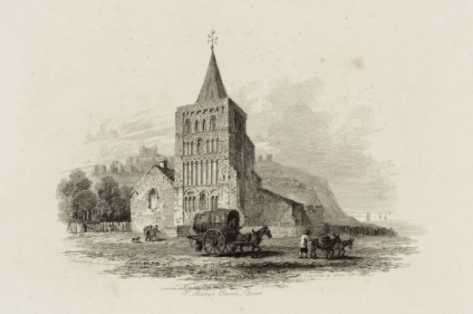
John Reading (1587/8-1667) was a Reformed conforming churchman. He studied at Magdalen Hall, Oxford, graduating BA in 1607 and MA in 1610. After his ordination he ministered in Dover, and became a royal chaplain to King Charles I. In the picture above, St Mary’s Church, where Reading ministered, can be seen with Dover Castle in the background on the left, and the white cliffs of Dover on the right. In 1643 and 1644 Reading took the livings of Chartham and Cheriton, Kent, and was chosen as one of 9 divines to write annotations on the New Testament, in what became commonly known as the Westminster Annotations.
While fervently Reformed in his theological convictions, Reading was at the same time a conformist and Royalist, and, despite agreeing doctrinally with the Puritans, did not support the Parliamentarian cause, instead preaching against rebellion and calling for loyalty to the king. His royalist sympathies would cost him his ecclesiastical livings and, after the discovery of a royalist plot to seize Dover Castle in early 1645, Reading ended up imprisoned in Leeds Castle in Kent, where he wrote A Guide to the Holy City (1651). He was released in 1647, and was restored to his Dover living in 1660, shortly before the Restoration. In fact, on 25 May 1660, when Charles II landed at Dover to reclaim the English throne, Reading presented to the king a large bible with gold clasps, in the name of the corporation of Dover, and made a short speech. After the Restoration he retook his former livings of Chartham and Cheriton, and became a prebendary of Canterbury.
At the beginning of his A Guide to the Holy City (p. 3-4) is found a wonderful prayer rounding off a meditation on “the necessity of a Christian’s aiming at a right end in all his actions”. In typically Reformed manner, Reading identifies God’s glory as the supreme end of all things, and the blessedness of the elect in the fruition (i.e. enjoyment) of God as inseparable but subordinate to this. Reading’s prayer follows the same pattern, in which he prays for this end and the means necessary to it:
Most gratious and most holy Lord God, who dwelling in unaccessible light of Majestie and glory, hast yet been pleased to manifest thy infinite power and unsearchable wisdome in all thy creatures, especially those who thou hast created to thine own image, to praise and glorifie thee in their eternall participation of thy divine blessednesse: Give us true wisdome to consider the end for which thou hast made us, make us truely understand that thy glory is incomparably better then all the creatures, and our salvation then all the world: Lord open our eyes that we sleep not in death: let not the transitory dreames of this present life beguile us: let not the malitious temper so prevaile upon our infirmities, as to cause us securely to run on in the easie way to destruction: but gratious Lord, as thou hast appointed the end, our eternall life, so be pleased to dispose the meanes which may lead us thereto: Thou canst as easily make us holy, as command us to be so: Lord therefore make us such as thou hast commanded us to be: make us faithfull to beleeve in thee, and obedient to serve and please thee, as thou hast in thy great and tender mercy given thy holy word to be a light and true guid unto us, so blessed Lord, give us of the same spirit, by which it was endited, which may lead us into all truth and holinesse, and (these daies of sinne being ended) into that holy and blessed inheritance, which thou hast prepared for all those whom thou hast elected to eternall life and salvation, through JESUS CHRIST our onely Saviour and Redeemer, to whom with thee and the holy Ghost be all honour and glory ascribed in heaven and earth henceforth and for ever, AMEN.
